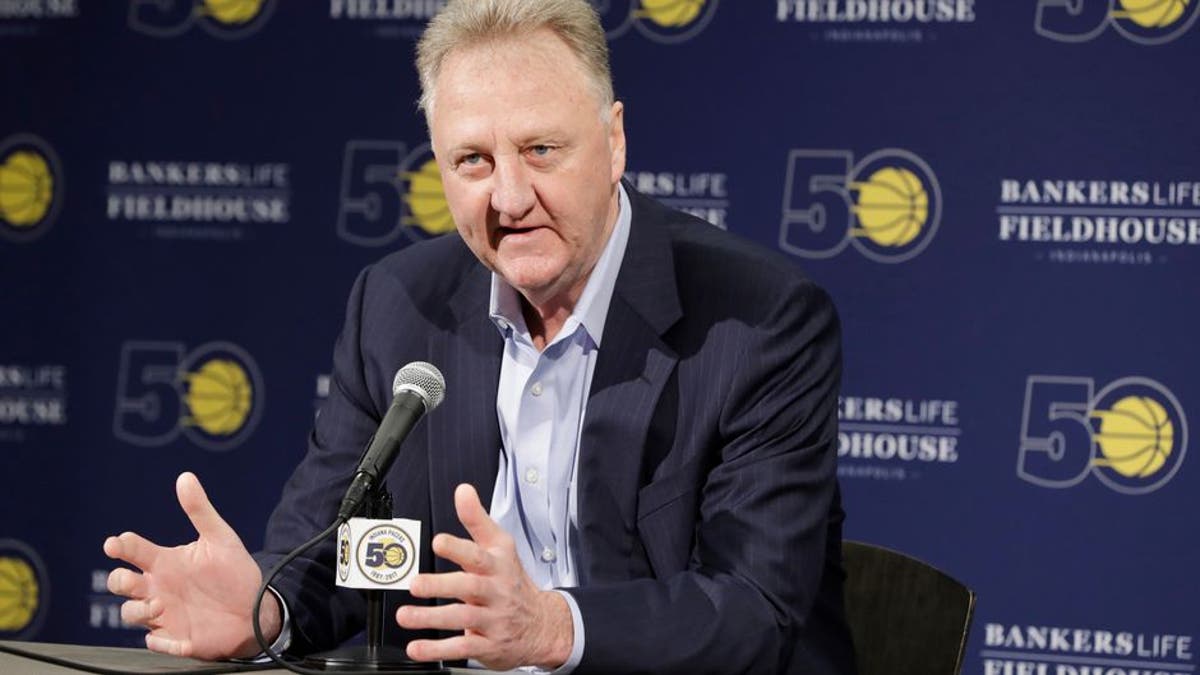
INDIANAPOLIS -- Larry Bird made it official Monday, resigning as the Indiana Pacers' president of basketball operations and saying simply that it was time to do something else.
"I felt it was time to step away in a full-time capacity," Bird said in a statement released ahead of a news conference. "This has nothing to do with my health or our team. I'm 60 years old and I want to do other things away from basketball."
It's the second time in five years he has walked away from Indiana's top front office position. General manager Kevin Pritchard will replace Bird as the Pacers' top decision-maker.
The move had been in the works since last week when word leaked that Bird was planning to leave the organization for the third time. He also resigned in 2000 after three seasons as Indiana's coach.
For the Hall of Famer, the decision could mark the end of an iconic NBA career that has spanned five decades. He is the only person in league history to collect the league's MVP, coach of the year and executive of the year awards. Bird said he will do some scouting for the Pacers and be an adviser to the team.
"I love the Pacers, I grew up with the Pacers and admired them from a very young age," said Bird, from French Lick, Indiana, and a star at Indiana State in Terre Haute. "I want to thank the fans for their support throughout my career. I also want to thank (owner) Herb Simon for the many years of loyalty and for allowing me to stay with the team in a different role."
As a player with the Boston Celtics, Bird won three NBA championships and three MVP awards. As a coach, he led the Pacers to three straight conference finals and their only appearance in the finals. And as team president, he was the architect of three teams that reached the Eastern Conference finals.
He was named the league's best coach in 1997-98, his rookie season as coach. More than a decade later, in 2011-12, he was selected as the NBA's top executive.
Yet even after putting together an all-state prep pedigree, leading Indiana State to the NCAA championship game in 1979 against Magic Johnson and Michigan State, and becoming the key component in the Celtics' revitalization, Bird couldn't achieve his last goal -- bringing the Pacers an NBA title.
And over the last two seasons, Bird increasingly became the target of criticism -- inside and outside the organization.
When he decided to switch from a traditional power team to the trendier small ball, All-Star Paul George openly complained about Bird's plan to move him from his natural small forward position to power forward. After trading several jabs publicly, Bird finally told reporters that, as the player, George would do whatever he was asked.
The experiment didn't last long and coach Frank Vogel moved George back to small forward during the 2015-16 season. Vogel was later fired.
Bird then continued the rebuildwith a series of bold moves, but the Pacers struggled. They needed to win their final five regular-season games just to make the playoffs, then wound up enduring the franchise's first four-game sweep against defending champion Cleveland.
Pritchard inherits a team in turmoil. Point guard Jeff Teague could hit free agency in July and the Pacers are anxiously waiting to see if George will commit to staying in Indiana beyond next season, when he could hit free agency.
If the Pacers don't get that commitment, Pritchard could be forced into making a blockbuster trade this summer.
As for Bird, his strongest legacy remains based in his time on the court. He is currently ranked No. 37 in career scoring with 21,791 points and No. 59 all-time with 8,974 rebounds, and he also won an Olympic gold medal while playing on the 1992 Dream Team. His No. 33 was retired by the Celtics in 1993 and a salary-cap rule was named after Bird.








































